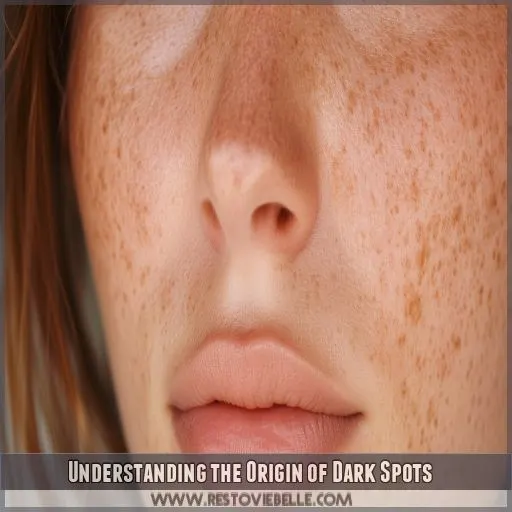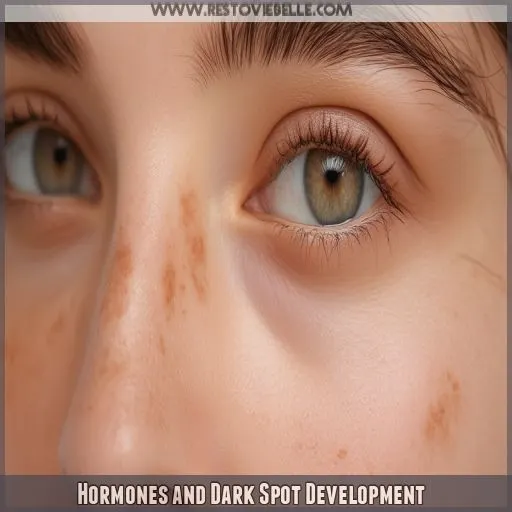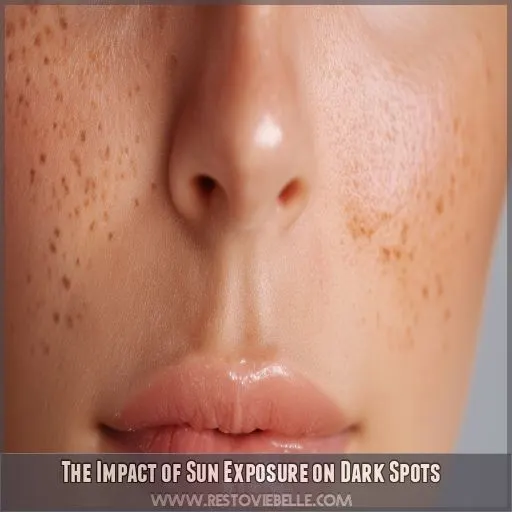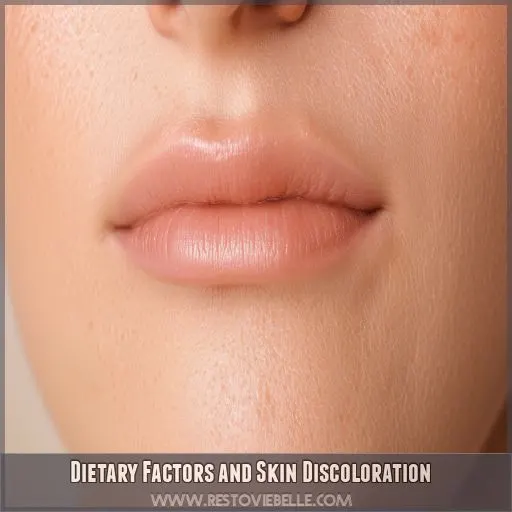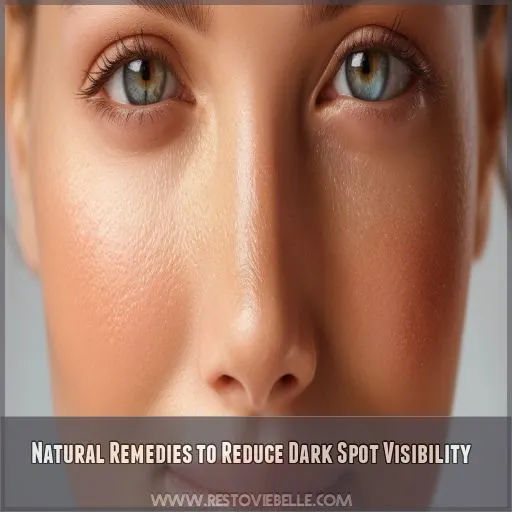This site is supported by our readers. We may earn a commission, at no cost to you, if you purchase through links.
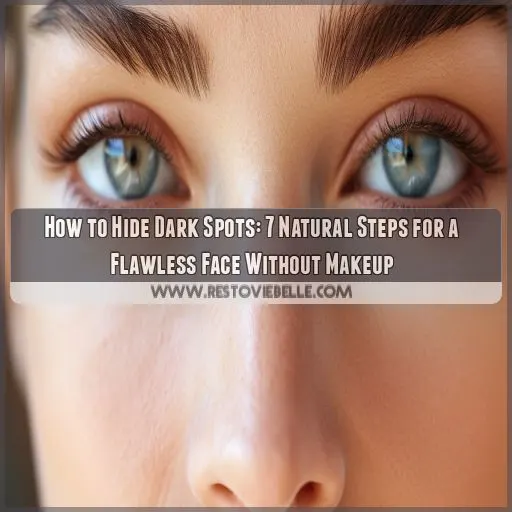
In this article, we’ll explore seven natural steps to reduce the visibility of those pesky spots. With a combination of understanding their origins and adopting effective natural remedies, you’ll be well on your way to a clearer complexion.
Table Of Contents
- Key Takeaways
- How to Hide Dark Spots on Your Face Without Makeup?
- Understanding the Origin of Dark Spots
- Hormones and Dark Spot Development
- The Impact of Sun Exposure on Dark Spots
- Dietary Factors and Skin Discoloration
- Natural Remedies to Reduce Dark Spot Visibility
- Frequently Asked Questions (FAQs)
- How can I hide dark spots on my face fast?
- How do you hide dark spots without makeup?
- How do you conceal dark spots on your face?
- What color cancels out dark spots?
- Can dark spots be improved without makeup?
- Whats the best way to cover dark spots?
- How do hormones impact dark spots?
- Does diet impact skin discolouration?
- What natural remedies reduce dark spots?
- Conclusion
Key Takeaways
- Let’s banish those pesky dark spots without resorting to makeup!
- Natural remedies like aloe vera, lemon, and papaya can help fade those spots away, leaving you with a radiant glow.
- Protect your skin from the sun’s wrath with SPF and sun-protective clothing. It’s like giving your skin an umbrella to shield it from those pesky UV rays!
- Hormones can play a role in dark spot formation, but don’t worry, it’s not all doom and gloom. Understanding the hormonal connection can help you manage and treat those spots effectively.
How to Hide Dark Spots on Your Face Without Makeup?
To hide dark spots on your face without makeup, focus on natural remedies and lifestyle changes.
Apply aloe vera to lighten hyperpigmentation and boost healing. Incorporate pomegranate, papaya, green veggies, and fatty fish into your diet to reduce pigmentation from within.
Use sunscreen and protective clothing, as UV rays make dark spots worse. Regularly exfoliate with gentle natural acids like those in buttermilk to remove dead skin cells.
Aloe vera, apple cider vinegar, and buttermilk can visibly lighten dark spots over time.
Curious about how these simple steps can transform your skincare routine? Stick around!
Understanding the Origin of Dark Spots
Dark spots, or hyperpigmentation, are a common skin condition that can affect anyone, regardless of age, gender, or skin color. These spots occur when certain areas of the skin produce more melanin, resulting in darker patches. Melanin is the natural substance that gives color to our skin, hair, and eyes.
There are several factors that can trigger the development of dark spots:
- Sun Exposure: Ultraviolet (UV) rays from the sun can cause skin cells to produce more melanin, leading to dark spots. This is why dark spots are commonly found on areas of the body that are frequently exposed to sunlight, such as the face, hands, shoulders, and arms.
- Aging: As we get older, our skin becomes more susceptible to wrinkles and age spots.
- Inflammation: Skin conditions like psoriasis and eczema can cause inflammation, which damages skin cells and increases melanin production, resulting in dark spots.
- Genetics: Some people may be genetically predisposed to developing dark spots.
- Pregnancy: Hormonal changes during pregnancy can stimulate an increase in melanin production, leading to dark spots. This is known as melasma or chloasma and usually fades after pregnancy.
- Medications: Certain medications, such as birth control pills, acne treatments, and anti-inflammatories, can have side effects that increase skin pigmentation and lead to dark spots.
It’s important to note that dark spots are usually harmless, but if you’re concerned about their appearance, there are cosmetic procedures and natural remedies available to help lighten or remove them. However, always consult a dermatologist or healthcare professional before starting any treatment.
Hormones and Dark Spot Development
Now that we’ve covered the basics of understanding dark spots, let’s examine the role of hormones in their development. Hormone fluctuations are a significant contributor to dark spots, particularly for women. During events like pregnancy, menopause, or when using birth control, hormonal changes can trigger an increase in skin pigmentation, leading to the formation of dark spots. This is often referred to as "melasma" or the "mask of pregnancy."
Additionally, stress plays a role in this process. When you’re stressed, your body produces higher levels of the hormone cortisol, which can impact your estrogen levels. This, in turn, can lead to increased pigmentation and the development of dark spots. Other hormones, such as those related to thyroid disorders, have also been implicated in the development of dark spots.
It’s worth noting that while hormones are a factor, they aren’t the sole cause of dark spots. Sun exposure, genetics, and skin irritation can also contribute. However, understanding the link between hormones and dark spots can help you manage and treat them effectively. Consulting with a dermatologist is a great first step to determine the best course of action for your specific situation.
The Impact of Sun Exposure on Dark Spots
Now, let’s turn our attention to the impact of sun exposure on dark spots.
- The sun’s ultraviolet (UV) rays can cause dark spots, also known as sunspots or age spots, on the skin due to increased melanin production.
- These spots are typically found on areas of the body that receive frequent sun exposure, such as the face, hands, shoulders, and arms.
- People with lighter skin who spend a lot of time in the sun are more likely to develop these spots, but anyone can get them if they don’t practice proper sunlight protection.
- To prevent dark spots from forming or becoming more noticeable, it’s essential to use protective measures such as sunscreen, sun-protective clothing, and avoiding the sun during peak hours.
- Use sunscreen with SPF 30 or higher, and reapply it every two hours or more often if you’re swimming or perspiring.
- Wear tightly woven clothing that covers your arms and legs, and a broad-brimmed hat to protect your face and neck.
- Avoid the sun between 10 am and 2 pm, when the sun’s rays are the most intense.
- Consider wearing clothing with an ultraviolet protection factor (UPF) of 40 to 50 for the best sun protection.
Dietary Factors and Skin Discoloration
Your diet can substantially impact the appearance of your skin, including the formation and visibility of dark spots. Consuming skin-healthy foods rich in antioxidants, vitamins, and minerals can help promote an even complexion and reduce hyperpigmentation.
Diet and Skin Health
As the saying goes, "you are what you eat." A healthy diet is essential for maintaining skin health and addressing issues like dark spots and hyperpigmentation. While sun exposure is a significant contributor to these skin concerns, dietary factors also play a vital role. Here’s how your diet can help:
| Food | Benefit |
|---|---|
| Pomegranate | Rich in polyphenols, protects against sun damage, and reduces dark spots. |
| Papaya | Contains papain, an enzyme that helps exfoliate and reduce skin pigmentation. |
| Green Vegetables | High in carotenoids, which prevent UV damage and reduce oxidative stress. |
| Carrots | Rich in antioxidants and phytochemicals, limiting hyperpigmentation and shielding from sun damage. |
| Fatty Fish | Rich in omega-3 fatty acids, which lower melanin production and tackle sun-induced hyperpigmentation. |
| Citrus Fruits | High in vitamin C, reducing dark spots, acne, and scarring. |
A balanced diet with these foods can help reduce the appearance of dark spots and promote overall skin health. Additionally, it’s imperative to limit or avoid certain foods that may worsen hyperpigmentation, such as soy, black beans, flax seeds, and chickpeas. Remember, always consult a dermatologist or a healthcare professional before making significant dietary changes.
Hyperpigmentation Diets
A healthy diet is key to fighting hyperpigmentation. Your skin, the body’s largest organ, needs high-quality nutrients to thrive.
A diet rich in antioxidants can help reduce skin darkening by encouraging melanin production, reducing free radicals, and supporting skin cell turnover. Citrus fruits, berries, and green vegetables are packed with vitamins and phytonutrients that brighten skin and protect against UV damage.
Fatty fish provide omega-3 fatty acids, reducing inflammation and sun-induced hyperpigmentation. Pomegranates, papaya, and carrots are also powerful tools in your diet to reduce skin discoloration.
Skin-Healthy Foods
Eating certain foods can help you achieve your beauty goals and improve skin discoloration. Here are some skin-healthy foods to include in your diet:
- Zinc-rich foods: Spinach, beef, shrimp, peanuts, kidney beans, and flax seeds are great sources of zinc, which is essential for cell production, wound healing, and protecting against UV damage.
- Vitamin C-rich foods: Citrus fruits, kiwi, tomatoes, broccoli, and bell peppers are loaded with vitamin C, an antioxidant that helps produce collagen and protects your skin from sun damage.
- Vitamin B12-rich foods: Salmon, red meat, dairy, eggs, and seafood are excellent sources of vitamin B12, which regulates pigment production and is necessary for healthy skin.
- Folic acid-rich foods: Leafy greens, nuts, whole grains, and citrus fruits provide folic acid, and a deficiency in this vitamin has been linked to hyperpigmentation.
Natural Remedies to Reduce Dark Spot Visibility
Now that you understand the various causes of dark spots, from hormones and sun exposure to diet and skin inflammation, let’s explore some natural remedies to reduce their visibility.
| Natural Remedy | How to Use | Benefits |
|---|---|---|
| Aloe Vera | Apply pure aloe vera gel or juice to dark spots for 30 minutes twice daily, then rinse with warm water. | Contains aloin, a natural compound that lightens skin and treats hyperpigmentation. |
| Apple Cider Vinegar | Mix equal parts apple cider vinegar and water, apply to dark spots, then rinse. | Contains acetic acid, which may help lighten pigmentation. |
| Buttermilk | Apply to dark spots for 15-20 minutes, then rinse. | Contains lactic acid, which helps lighten skin discoloration. |
| Horseradish | Apply horseradish paste to the skin for 15 minutes, then rinse. For a more aggressive treatment, combine grated horseradish and apple cider vinegar, apply to dark spots 3x daily for a month. | May help reduce dark spots over time. |
| Hydrogen Peroxide | Mix hydrogen peroxide with milk, apply to dark spots with a cotton pad, leave for 15 minutes, then rinse. | Can help lighten dark spots with regular use. |
| Lemon | Apply a slice of lemon to the affected area for 10 minutes, twice daily. For sensitive skin, dilute lemon juice with water or rose water. | Contains citric acid, which may help lighten dark spots. |
| Papaya | Blend papaya into a paste and apply to the face and neck for 20-30 minutes, twice daily, then rinse. | Contains alpha-hydroxy acids that act as chemical exfoliants, removing dead skin cells and brightening the skin. |
| Parsley, Baking Soda, and Yogurt Mask | Combine chopped parsley, baking soda, and yogurt, apply to the face, neck, and chest for 15 minutes, then rinse. Repeat twice a week. | Yogurt contains lactic acid, which exfoliates the skin, while parsley provides additional antioxidants. |
| Sandalwood, Orange Zest, and Orange Juice Mask | Combine sandalwood powder, orange zest, and enough orange juice to form a smooth paste. Apply to the face and neck for 15 minutes, then rinse. Repeat 1-2 times a week. | Orange juice contains citric acid, which may help lighten dark spots, while sandalwood has skin-soothing properties. |
| Rice Water, Flour, and Turmeric | Mix rice water, flour, and turmeric, dab the mixture onto dark spots with a Q-tip, leave for 20 minutes, then rinse. | Turmeric inhibits melanin production, reducing hyperpigmentation, while rice water and flour provide gentle exfoliation. |
Frequently Asked Questions (FAQs)
How can I hide dark spots on my face fast?
To quickly hide dark spots on your face without makeup, try a tinted sunscreen. It’ll give your skin a glow while also preventing your spots from darkening further.
How do you hide dark spots without makeup?
Oh, those pesky dark spots! They’re like uninvited guests who just won’t leave.
But fear not, for there are ways to show them the door without relying on makeup.
First, grab your exfoliating wand and cast a spell—or, rather, a gentle exfoliant—to slay those dead skin cells and excess pigments.
Next, wave your antioxidant serum wand to calm inflamed skin and protect against sun damage.
How do you conceal dark spots on your face?
First, prep your skin with cleanser, moisturizer, and primer. Next, use a color-correcting concealer on your dark spots, then apply foundation. Set your makeup with translucent powder and finish with setting spray.
What color cancels out dark spots?
Dark spots got you down? Well, cheer up, buttercup! Color-correcting concealers can neutralize those pesky spots. Green cancels out red, yellow counters purple, and peach or orange? They’re perfect for blue or purple circles. So, go ahead, cancel out those dark spots with the right shade!
Can dark spots be improved without makeup?
Yes, you can improve dark spots without makeup. It may take time, but proper skincare, a healthy lifestyle, and certain treatments can reduce their appearance.
Whats the best way to cover dark spots?
So, you want to cover up those dark spots, huh? Well, you could just embrace them as beauty marks, but if you’re determined to conceal them, here’s the deal.
First, prep your skin with a cleanser, then apply a primer.
Next, color-correct those spots with a peach or pink concealer. After that, apply foundation and concealer, setting your look with powder or setting spray.
How do hormones impact dark spots?
Fluctuating hormones, particularly estrogen and progesterone, can cause dark spots by stimulating melanin overproduction. This occurs more often in women, specifically during pregnancy, menopause, and when taking birth control pills or hormone replacement therapy.
Does diet impact skin discolouration?
A healthy, balanced diet is key to achieving clear, glowing skin. Eating foods rich in antioxidants, like colourful fruits and vegetables, can help fight skin damage and prevent premature ageing.
On the other hand, a diet high in sugar and processed foods can lead to inflammation, acne, and wrinkles. So, limit those sugary treats and reach for a delicious, antioxidant-rich snack instead!
What natural remedies reduce dark spots?
Natural remedies that may help reduce dark spots include:
- Aloe vera
- Apple cider vinegar
- Lemon juice
- Honey
- Yogurt
- Papaya
- Vitamin C
Conclusion
Understanding the origins of hyperpigmentation, whether it’s sun exposure, aging, acne, or hormones, is the first step to mastering how to hide dark spots on your face without cosmetics.
Knowledge is power in achieving clear skin and tackling those pesky dark spots. By adopting natural remedies and making informed dietary choices, you can reduce their visibility and embrace a flawless, confident complexion.

